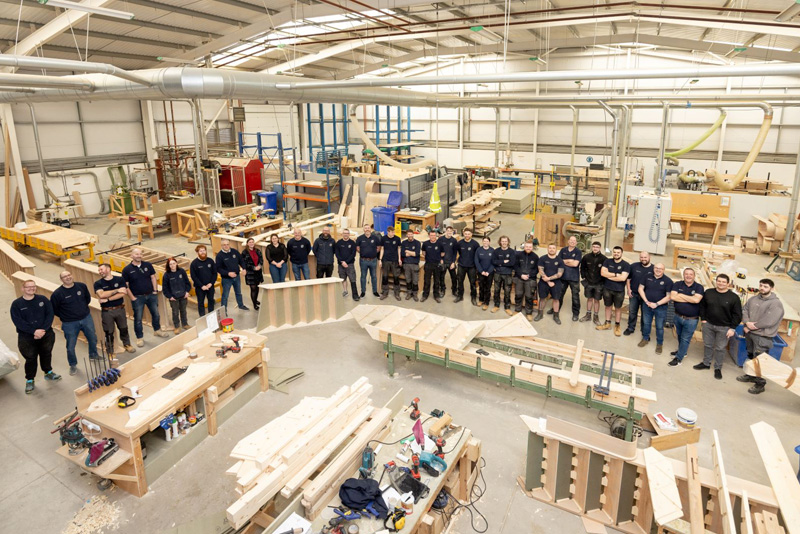
Derbyshire-based staircase manufacturer TwoTwenty has announced its sale to an employee ownership trust (EOT) in a move described as securing a ‘perfect future’ for the business.
TwoTwenty was incorporated in May 2005 and has a purpose-built factory and HQ in Foston, Derbyshire and another manufacturing centre in Kirby Lonsdale, Cumbria. The company has built an award-winning reputation in the design and manufacture of bespoke timber staircases for new build homes, conversions and renovations, selling mostly through independent and national builders’ merchants, including all of the top 10 merchants in England.
The transition of the firm, along with its holding company Elephant Holdings, to a business that is 100% employee-owned is believed to be the first such deal in the UK timber engineering sector and secures the jobs of 40 staff. Furthermore, no funding or contributions have been required from any employee to fund the purchase of the business by the EOT, and under the terms of the deal, all staff are expected to benefit from significant tax-free bonuses in future years as well as deciding the company’s future strategy and growth plans.
All the existing senior leadership team will remain closely involved in the business as trustee directors, including TwoTwenty’s current MD Scott Peden, commercial director Jason Stain, Jason Ward, and Lisa Richards of Dains accountants, which has advised on the sale of the business and creation of the EOT.
Perfect future
Ali Wright, founder of TwoTwenty, will also become Chair of the EOT. He said: “We passionately believe that our colleagues are the thing that make TwoTwenty successful, so becoming an EOT secures the perfect future for this business.
“As a small business, in reality we only have a few options for the next phase of growth. We did not want to pursue a trade sale as that does not secure the long-term future for our staff. We did not want to pursue an external investor or management buy-out because of the huge pressure and obligation it brings on future performance. We could not simply share the ongoing profits of TwoTwenty with our employees as that would make us unsaleable, and I certainly couldn’t imagine exiting by just closing down such a strong and vibrant company.
“In effect, we are a family business whose employees are not related, so to create an EOT resonates with every value we have ever aspired to. It creates a legacy for us, provides security for all the staff, and allows us to handsomely reward every employee for the hard work and effort they put in.”
Within the next couple of months, a new Employee Council will be established to guide and inform trustees’ decision making. This will involve employee representatives from different parts of the business, including those on the shop floor.
Steve Chapman, director at TwoTwenty, commented: “The EOT allows Ali and me to leave the business in the future knowing that we have shown our appreciation for the fantastic team in TwoTwenty, some of whom have been with us from the start. They regularly go above and beyond to provide a great product and service for our customers, so this deal gives financial recognition for that commitment and hard work.
“The Employee Council will be the thing that really makes the magic happen. The engagement and ongoing buy-in of our staff will transform the ability of TwoTwenty to capitalise on the huge opportunities ahead. It also allows us to make a 10% pay rise for everyone and to introduce a new scheme that facilitates a minimum of 22.5% higher pension contributions for each employee. These commitments can genuinely change the lives of our employees and their families.”
MD Scott Peden added: “I am extremely excited for the future, to move forward with the Employee Council, EOT trustees and the whole amazing team to build on the legacy founded by Ali and Steve, ensuring the TwoTwenty ethos, which has contributed to our current success, remains at the very heart of this company.
“Our colleagues will now have a true sense of ownership, creating job security and demonstrating how their daily activities make a direct impact on the business. I don’t know of any companies within our industry that have chosen this exit route, which has made us want to do it even more.”
According to the Employee Ownership Association, the benefits of companies becoming employee-owned include improved productivity and employee engagement and more resilient regional economies. There are now more than 1,000 employee-owned companies in the UK.









